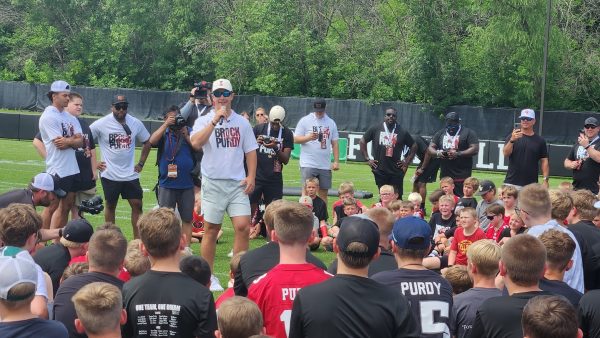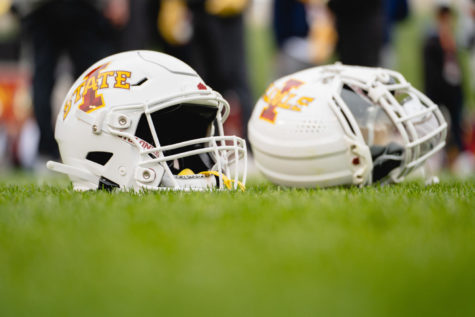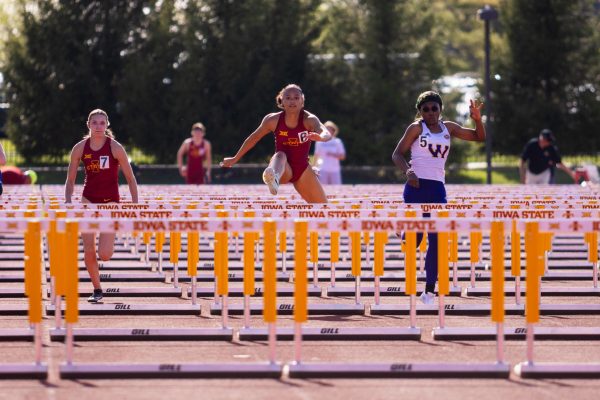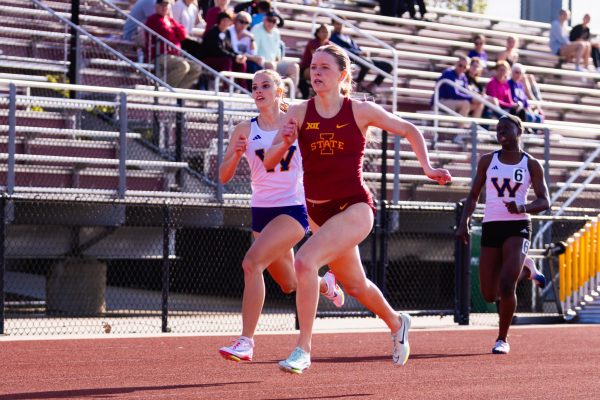- Sports
- Sports / Mens Cross Country
- Sports / Mens Track Field
- Sports / Womens Cross Country
- Sports / Womens Track Field
Administrators, coach reflect on past athletic success
April 29, 2012
A Division III national champion, a member of the 1994 national champion cross-country team and an Olympic bronze medalist. These three titles are also associated with faculty members at Iowa State.
Iowa State is known for having produced national championships, conference championships and a plethora of All-Americans. However, some members of the administrative faculty have had athletic success of their own as well.
One ex-collegiate athlete that contributes his time and work to Iowa State is Athletic Director Jamie Pollard.
Jamie Pollard
Pollard attended the University of Wisconsin-Oshkosh, where he continued his track career after high school.
Pollard was a distance runner throughout college, running anywhere from the 800-meter run to the 5k. However, Pollard said he preferred the atmosphere of indoor track.
“I loved indoor track, my favorite by far,” Pollard said. “I loved running the mile indoors because of the stimulation of the crowd.”
Pollard achieved his Division III title in the 5k at North Central College in Naperville, Ill. For three or four weeks prior to the event, Pollard said everything he touched was a personal best.
“It was the only time in my life that I got into the mindset that I felt I was unbeatable,” Pollard said. “I just knew I was going to win.”
Pollard said the whole 5k was slow and he became nervous because he felt he was going out too fast. So with 1,200 meters to go, Pollard kicked and went for the win.
“I was completely alone the last lap. It was quiet,” Pollard said. “It was a weird feeling because you don’t think of winning like that at nationals.”
Pollard said he is still actively involved with track and field as the athletic director at Iowa State as well as watching his children run track.
Even though Pollard did not compete as a Cyclone, ISU track-and-field coach Corey Ihmels can say he is a distinguished alumnus.
Corey Ihmels
Ihmels is in his seventh year as the director of the cross-country and track programs at Iowa State.
Ihmels was an All-American long-distance runner as a freshman on the 1994 cross-country team that won a national championship — the school’s most recent title in the sport.
“I was fortunate to be around a tremendous coach and a great group of teammates,” Ihmels said. “It was an era where when I got here, there was a lot of success and a lot of tradition. I was fortunate to have that five-year experience and that’s something you don’t forget.”
Ihmels, a four-time All-American in cross-country, was a sub-4:00-minute mile runner who earned conference championships in the mile and 1,000-meter run.
Ihmels put the year into perspective that all around, the main goal was to go into nationals and win. With a depth of extremely athletic runners, Ihmels said there wasn’t a way they weren’t going to win that year.
“That year, we put everything into being the best,” Ihmels said. “[Coach] Bill [Bergan] was man of few words — he was a motivator, but he wasn’t going to give any halftime speeches like Paul Rhoads.”
As a coach, Ihmels has helped Iowa State produce more All-American runners as well as professional competitors and Olympic hopefuls such as Betsy Saina, Grace Kemmey and Lisa Koll.
Ihmels has propelled his women’s team into the No. 25 position in the nation poll for track and field, as well as a 10th-place finish at the cross-country nationals last fall.
Last but not least is maybe one of the most prominent ex-athletes Iowa State employs — Vice President of Student Affairs Tom Hill.
Tom Hill
Hill was chosen to represent the United States at the 1972 Summer Olympics in Munich, Germany, where he won a bronze medal in the 110-meter hurdles.
Hill said he had a life-changing moment when Arkansas State offered him a scholarship to run hurdles at the peak of the civil rights movement and racial discrimination in the South.
“When I got there, my coach had this thing in his head that he was going to make me into a really good hurdler,” Hill said. “I thought if [my coach] was paying for it, whatever. You could make me a shot putter, I don’t care.”
Hill said he described his attitude as an “if you want me to do it, I’ll do it, and I’ll be the best at it” attitude. By the end of his first year at Arkansas State, Hill had dropped his hurdle time down to 14.2 seconds, a full second off his entrance time.
And then there was the world record.
“I went from 15.2 my first race to 14.2 freshman year,” Hill said. “I ended up running 13.6 my sophomore year, then I ran 13.2 my junior year, which was the world record.
“It was just crazy. I was having fun and I wasn’t that knowledgeable about it, so I didn’t know you weren’t supposed to do that.”
In 1972, Hill returned into the spotlight of the track-and-field world and made the trip to Munich for the Olympics. After the 110-meter race, Hill said he had a surreal moment as he watched the names flash on the scoreboard.
“It was like a dream come true,” Hill said. “They put Rod Milburn first, Guy Drut second, and then they stopped. And there was this long pause. Then they flashed ‘Hill, USA,’ and I jumped about 30 feet in the air.”
After winning the bronze medal, Hill said he talked with his teammates and about how unreal it all felt.
Hill said the experiences he encountered would be with him for the rest of his life. Not only did he learn how to be a world-class athlete from the Olympics, Hill said, but a world-class person as well.
“Sure, I would have loved to have won, but I also have to understand that everybody can’t win and you need to learn to compete,” Hill said. “And if you can walk away knowing you gave it your best, then life’s good.”
















